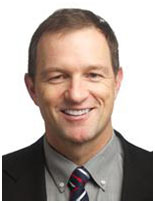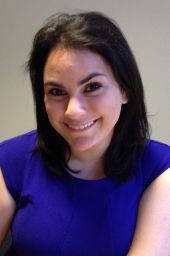'A life of the mind' in the centre of Groningen
Professor Steve Mason (University of Aberdeen) was bizarrely busy during his four months in Groningen. As the first Dirk Smilde Fellow of the Qumran Institute at the Faculty of Theology and Religious Studies, he was kept busy with his students back home, with lectures, book reviews, Qumran Institute seminars and – to his surprise – interviews with Dutch journalists. He was so busy that he hardly had time to continue his translation work on his favourite subject: Flavius Josephus, the historian and master narrator from the 1st century BC, and the source of our interpretations of the Bible. Mason gives the impression that his affinity with Josephus is no coincidence – he is as gifted a narrator as the historian from antiquity.

Flavius Josephus
Mason became interested in Josephus through his research on other subjects. This prolific historian wrote 30 volumes chronicling the world in which he was living, with a continuous retelling of the Old Testament, and about the Judeo-Roman war of 66 AD. Mason and his team, comprising scholars from all over the world, have now translated 15 of the 30 volumes from Greek into English. ‘Josephus is a narrator. There is no doubt that he was protecting people in his accounts. But who and why? And above all, how do we know he did that, and where? And how do we address this?’ Mason talks enthusiastically about Josephus. Scholars doubted for a long time whether Josephus had written all the texts, given the number of manuscripts and his upbringing.
Nothing compares with Groningen
Mason was impressed with Groningen from the beginning of his stay, and nothing could spoil it for him. ‘The collegiality is unbelievable. I’ve never been made to feel so welcome anywhere, or experienced such a spirit of generosity among colleagues. And I’ve never lived in such a truly academic city. None of the other university cities I know can compare with Groningen. Colleagues discuss their research freely with each other; they take an interest and aren’t envious.’ Mason is particularly impressed with the protected yet stimulating environment in which the seminars of the Qumran Institute were held. ‘After the seminars we just continued the discussions, and we ate and drank together. We talked about ideas, and that’s how it should be in an academic environment.’
The first time Mason sensed that Groningen would provide a stimulating academic environment was two years ago, when Professor Mladen Popović of the Qumran Institute paid him an impromptu visit in Aberdeen to talk about his research, purely out of interest. They talked for days, the only interruptions being Mason’s teaching duties. He had never experienced anything like this before, so when Popović offered him the Dirk Smilde Fellowship in Groningen, he accepted straightaway.
Dutch interest in academic research is unique
Steve Mason is still surprised at the level of interest shown in academic research in the Netherlands. One of his interviews was with the NRC newspaper. ‘They have a real academic supplement and were genuinely interested in my research. In Canada, such an interest in the Humanities and the Arts is inconceivable. The most you’ll see is a report on a breakthrough in a clinical trial.’ He stresses that the academic ‘life of the mind’ should remain independent. “The University is the perfect environment for fundamental scientific research. And this public interest in my research is a perfect match between science and society. It is extraordinary that the Dirk Smilde Fellowship is established through private funding. A great sign that the research at the Institute is highly valued.”

Dirk Smilde Scholar: Bernie Hodkin
The American PhD-student Bernie Hodkin (22) applied as soon as the Dirk Smilde Scholarship was announced because it would give her the opportunity to spend three months working with Steve Mason.
‘Steve is not only unique in his research field,’ she explains, ‘He is also productive and leads you to openings in your own research by being critical about the questions you’re asking.’ She was also surprised about the openness of the seminars. ‘I was able to use every question I was asked to focus more sharply in my research. We asked questions to help each other, not to refute someone’s work.’
Hodkin was in Groningen from February until May. Her research, which she will continue at the Jewish Theological Seminary in New York, focuses on the Rabbinical texts, from a period 400 years later than that of Mason’s research. Reformulating her research question was the high point of her stay. Not that she was struggling; Mason enabled her to see the value of her research from a different perspective. Did she want to go along with ‘okay’, or did she want to stand out?
She was also impressed by the healthy life/work balance in Groningen. ‘It’s considered normal to want a personal life’, she says hesitantly, as if she’s not sure whether that is a good or a bad thing. And something else: an agreement really is an agreement here. Back home in the US she is used to making several arrangements in the evenings, because one or two are always likely to be cancelled. But doing that in Groningen can lead to difficulties, she says. Hodkin spent last summer in Berlin, learning German. In Groningen she took a Dutch language course. ‘If you want to succeed as an academic you have to capitalize on your chances and not allow language to be an obstacle.’
Tips for successors
For the first recipients of the Dirk Smilde Fellowship and Scholarship, the period in Groningen was largely an experience of great personal significance. Nevertheless, Hodkin has some practical advice for her successors from abroad who will be here for a short time: organize your visa before you leave home. The bureaucracy here is so short on explanation that you could even call it intransigent. Be aware that anything to do with money – such as topping up your public-transport smart card – is directly linked to your bank account. That’s a problem if you’ve only brought credit cards with you. On her last day she’s making time to visit the Groninger Museum. ‘There’s so much to do here that I just haven’t had time yet. But leaving without seeing the museum – that’s just not on!’
| Last modified: | 18 September 2023 4.22 p.m. |
More news
-
05 March 2025
Women in Science
The UG celebrates International Women’s Day with a special photo series: Women in Science.
-
10 February 2025
Project GRACE: An ENLIGHT ETN Grant Winner
We are happy to announce that the project GRACE, with Julia Martínez-Ariño as the main coordinator, is one of the projects selected for the ENLIGHT 2024 Call. Congratulations to the GRACE team.
